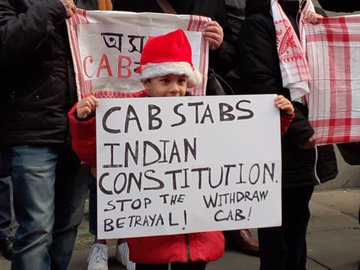Kerala Chief Minister Pinarayi Vijayan has stalled the National Population Register (NPR) in the state amid allegations that the exercise the “first step towards the National Register of Citizens (NRC)”.
The Chief Minister’s office issued a statement that said the NPR “deviates from constitutional values”. “Considering that the apprehensions among the general public that the conduct of NPR related activities leads to NRC in the wake of Citizenship Amendment Act-2019, the state government orders to stay all the activities connected with the updation of National Population Register in the state forthwith,” the statement said.
Earlier this week, West Bengal Chief Minister Mamata Banerjee also put a stay on the NPR in her state amid massive protests against the Citizenship Amendment Act (CAA).
Critics of the law say that it discriminates against Muslims and along with the proposed NRC, it would mean that “only the Muslims would be filtered out”.
Banerjee’s Bihar counterpart Nitish Kumar and Lok Janshakti Party president Chirag Paswan, both allies of the ruling BJP in the state and at the Centre, have objected to the implementation of nationwide NRC. “Kahaan ke liye laagu hoga, ekdum nahin laagu hoga (Why should it (NRC) be implemented? It will not be implemented (in Bihar)”, said the Bihar CM.
As protests against the CAA are intensifying by the day, the government appears to have switched to damage control mode.
Home Minister Amit Shah has more than often announced in the parliament that the government will carry out a nationwide NRC.
However, Union Minister Mukhtar Abbas Naqvi said there is “no plan for a nationwide NRC” and that “there has so far been no discussion on the matter at any level of government.”
Naqvi reiterated that the NRC is only limited to Assam and there is no such plans for the country.
What is NPR?
According to the website of the Office of the Registrar General and Census Commissioner, the objective of the NPR is to create a comprehensive identity database of every usual resident in the country. The database will contain demographic as well as biometric details.
The pilot project had questions related to demographic details such as name, age, sex, relationship in household, nationality, educational qualifications, occupation, date of birth, marital status, residential address, birthplace and mother tongue.
The NPR exercise will be conducted in conjunction with the house listing phase, the first phase for Census 2021.
The NPR exercise is conducted at the local, sub-district, district, state and national levels.
Origin of NPR
The legal framework for the National Population Register is grounded in the Citizenship Act, 1955. In 2003, the Act was amended by the Atal Bihari Vajpayee-led BJP government to introduce the category of an “illegal migrant”.
What is NRC?
The NRC is an official record of those who are legal Indian citizens. It includes demographic information about all those individuals who qualify as citizens of India as per the Citizenship Act, 1955. It is a state-specific exercise and has been conducted only in Assam so far.
The NRC includes names of those persons (or their descendants) who appear in any of the Electoral Rolls up to the midnight of March 24, 1971 or in any one of the other admissible documents issued up to mid-night of March 24, 1971, which would prove their presence in Assam or in any part of India on or before March 24, 1971.
How are NPR and NRC related?
Economist and convener of the Joint Forum against National Register of Citizens, Prasenjit Bose has described the National Population Register as the “first step on the road to the National Register of Citizens”, according to a report by news website Scroll.
The data collected during NPR will be used when the National Register of Citizens will be rolled out across the country. The central government has decided to prepare the NPR between April 2020 and September 2020. The mammoth nationwide exercise will be carried out in 16 languages, at a cost of Rs 12,000 crore. The census data will be collected through a mobile app.
The NPR would create a list of usual residents of the country. A usual resident is defined as a person who has resided in a local area for past six months or more or a person who intends to reside in that area for the next six months or more.
The NPR exercise will be conducted in conjunction with the house listing phase, the first phase for Census 2021. It is conducted at the local, sub-district, district, state and national levels.
Once the NPR is completed and published, it is expected to be the basis for preparing the National Register of Indian Citizens (NRIC), a pan-India version of Assam’s NRC. The NRC will take the NPR list and identify people of “doubtful citizenship”.
The final NRC will be prepared by asking “doubtful citizens” to prove they are Indians as part of a “claims and objections” process.


